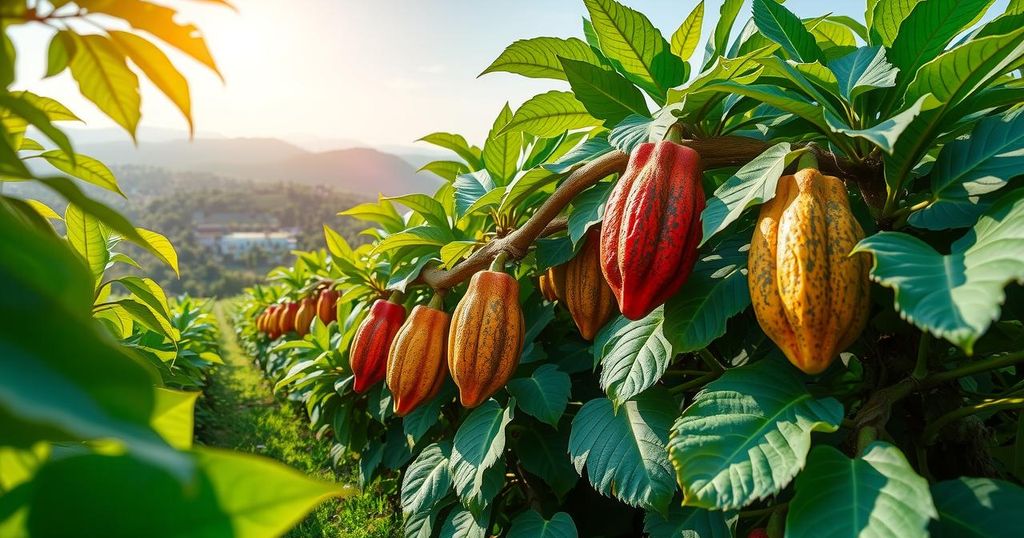Nigeria’s cocoa industry is on an upward trajectory, marked by a 700% increase in prices due to global demand and investment. The sector’s transformation supports the country’s economic diversification, offering new revenue opportunities while enhancing agricultural exports. Recent investments aim to optimize production and sustainability, positioning Nigeria to reclaim its status in the global cocoa market.
Nigeria’s cocoa industry is stepping into the spotlight as a crucial component of the country’s economic diversification, marked by soaring prices and heightened investor interest. With an impressive increase in global demand and an influx of investments, cocoa is poised to enrich Nigeria’s non-oil economy and reform its position in the international cocoa market.
Currently, cocoa prices in Nigeria have surged by over 700% since January 2023, reaching ₦15 million (approximately US$10,000) per tonne by December 2024. This spike is attributed to global supply shortages and increased demand from Europe and Asia, alongside fluctuating currency values, as reported by the Cocoa Research Institute of Nigeria (CRIN).
Financial expert Oluwatobi Falegan emphasizes that the transformation within the cocoa sector extends beyond cocoa itself; it may stimulate demand for various other agricultural goods, resonating with Nigeria’s broader ambitions of economic diversification. Cocoa’s triumph is setting a precedent for products like cashews, sesame seeds, and ginger, crucial to Nigeria’s agricultural renaissance.
Recently, British International Investment (BII) announced a significant partnership with Johnvents Group, investing US$40.5 million to enhance production efficiency and sustainability initiatives in Nigeria’s cocoa industry. BII’s coverage director, Benson Adenuga, noted that this investment will benefit local farmers and enhance the nation’s trade balance and export capabilities.
Cocoa remains one of Nigeria’s largest non-oil exports, cultivated by over 300,000 smallholder farmers predominantly in the southern regions. The World Atlas ranks Nigeria as the seventh-largest cocoa producer globally, contributing around 270,000 metric tons annually, markedly lagging behind its West African neighbors such as Côte d’Ivoire and Ghana.
While many African nations primarily export raw cocoa beans, Nigeria is no exception, with around 90% of its cocoa exported unprocessed, resulting in lost revenue from the lucrative chocolate market, valued at US$130 billion. Comparatively, some cocoa-producing nations, like Côte d’Ivoire and Ghana, experience similar trends of exporting whole beans.
Nonetheless, the dynamics are shifting, as increased production volumes and a growing influx of investments reflect positively on the cocoa market within Nigeria. Disruptions in cocoa supply from Côte d’Ivoire and Ghana have further catalyzed Nigeria’s export growth.
According to the National Bureau of Statistics (NBS) for 2025, cocoa formed 7.12% of total agricultural exports, proving to be a strong performer in recent years. As Nigeria’s oil sector contributed less than 5% to the national GDP in the last quarter of 2024, agricultural efforts accounted for 25.59%, underscoring a vital shift towards non-oil economic activities.
Dominic Joshua, the founder of Cultivate Africa, remarked that if current trends persist, “cocoa can generate more revenue than oil in the next decade… But the time to act is now.” This indicates a pressing need for the government to enhance support for agriculture and implement sustainable practices in alignment with EU standards, thereby boosting other commodities as well.
In summary, Nigeria’s cocoa industry stands as a burgeoning sector with significant potential for economic diversification. The substantial increase in cocoa prices and investments signifies a shift towards agricultural enhancement. With strategic support, cocoa could lay the groundwork for Nigeria to reclaim its position in the global market and foster greater revenue generation beyond oil.
Original Source: www.independent.co.ug




